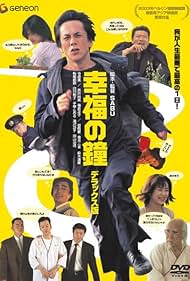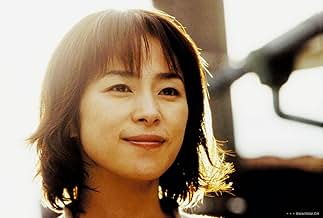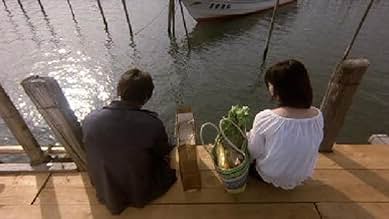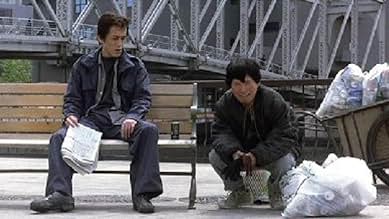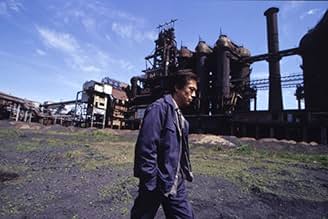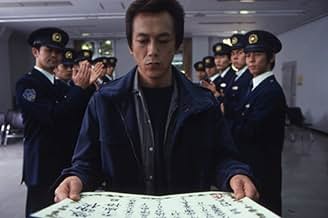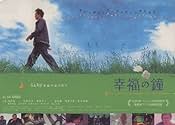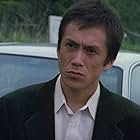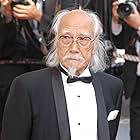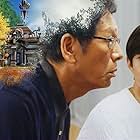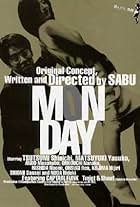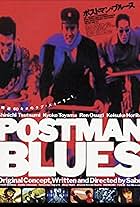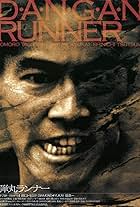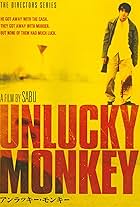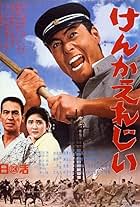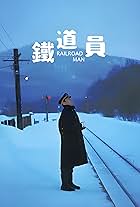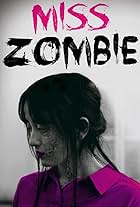VALUTAZIONE IMDb
7,2/10
727
LA TUA VALUTAZIONE
Aggiungi una trama nella tua linguaAfter losing his job at the factory Igarashi aimlessly wanders through Tokyo where he encounters various people and gains insight into their lives.After losing his job at the factory Igarashi aimlessly wanders through Tokyo where he encounters various people and gains insight into their lives.After losing his job at the factory Igarashi aimlessly wanders through Tokyo where he encounters various people and gains insight into their lives.
- Regia
- Sceneggiatura
- Star
- Premi
- 2 vittorie e 1 candidatura in totale
Trama
Lo sapevi?
- QuizReleased in the same year as Doraibu (2002). Both films star Susumu Terajima and are directed by Sabu.
Recensione in evidenza
I think it's a shame how underrated this movie is. Its slow pace, little conversation, even less action and not specific topic doesn't make it easy to understand and "digest", especially not for people who are not used to art movies, but nobody should call this a bad or boring movie just because he didn't understand it.
SABU, director of masterpieces like Drive, Postman blues, Monday or Unlucky Monkey, didn't use so much of his famous dark, absurd and grotesque humor and of very sad and dramatic scenes either (which are typical for his other movies). This movie is very balanced, very harmonic, very peaceful. Susumu Terajima, who has small roles in other Sabu movies, is the main character here. I love him and his style and his very minimal but professional and essential acting makes the movie even better.
The story is about a man who goes to work, finds that the factory is closed down, therefore goes and wanders around for a day and a night, then goes back home. Some interesting things happen to him during this, but not very much compared to the time he spends sitting or walking or just standing and staring.
So what's this all about? No action, very little humor, very little drama, but why did someone make a movie like this? The answer is that it's REALLY very important that the movie is slow paced and only a few things happen. The main character says nothing during the 95% of the movie! He just observes, and then, if necessary, acts. He doesn't judge, doesn't interfere. He gains some money from someone who doesn't need it then he loses it. So what. He have had it and now he doesn't have it, and that's all. Accepting everything. That's the zen philosophy. Looking at the world as it is, looking at the pure form, at the real meaning of things. There is some scenes connected with sins and jealousy and money and sickness and death and love, but it's kept very simple. It's all about life but it's not direct at all, the thinking part is up to you, the viewer, nothing is explained, and that's why it works so wonderful and also why so many people don't understand it.
Very much worth seeing if you're into art movies or if you're keen on Sabu and if you're interested in Zen.
SABU, director of masterpieces like Drive, Postman blues, Monday or Unlucky Monkey, didn't use so much of his famous dark, absurd and grotesque humor and of very sad and dramatic scenes either (which are typical for his other movies). This movie is very balanced, very harmonic, very peaceful. Susumu Terajima, who has small roles in other Sabu movies, is the main character here. I love him and his style and his very minimal but professional and essential acting makes the movie even better.
The story is about a man who goes to work, finds that the factory is closed down, therefore goes and wanders around for a day and a night, then goes back home. Some interesting things happen to him during this, but not very much compared to the time he spends sitting or walking or just standing and staring.
So what's this all about? No action, very little humor, very little drama, but why did someone make a movie like this? The answer is that it's REALLY very important that the movie is slow paced and only a few things happen. The main character says nothing during the 95% of the movie! He just observes, and then, if necessary, acts. He doesn't judge, doesn't interfere. He gains some money from someone who doesn't need it then he loses it. So what. He have had it and now he doesn't have it, and that's all. Accepting everything. That's the zen philosophy. Looking at the world as it is, looking at the pure form, at the real meaning of things. There is some scenes connected with sins and jealousy and money and sickness and death and love, but it's kept very simple. It's all about life but it's not direct at all, the thinking part is up to you, the viewer, nothing is explained, and that's why it works so wonderful and also why so many people don't understand it.
Very much worth seeing if you're into art movies or if you're keen on Sabu and if you're interested in Zen.
- kazan-bandi
- 24 dic 2006
- Permalink
I più visti
Accedi per valutare e creare un elenco di titoli salvati per ottenere consigli personalizzati
Dettagli
- Data di uscita
- Paese di origine
- Sito ufficiale
- Lingua
- Celebre anche come
- Колокол благословения
- Aziende produttrici
- Vedi altri crediti dell’azienda su IMDbPro
- Tempo di esecuzione1 ora 27 minuti
- Colore
- Proporzioni
- 1.85 : 1
Contribuisci a questa pagina
Suggerisci una modifica o aggiungi i contenuti mancanti

Divario superiore
By what name was Blessing Bell (2002) officially released in Canada in English?
Rispondi